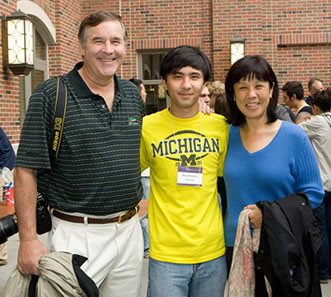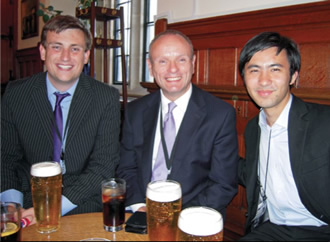Up by 6 a.m. scanning newspapers and listening to TV news anchors, Brian Wanglin's mornings haven't changed much from his days as an intern. And he couldn't be happier.
"I knew that after college I wanted to work on campaigns," said Wanglin (BA '11), now working for a Washington, DC consulting firm that specializes in campaigns. His responsibilities include media monitoring and rapid response, i.e., addressing critical media stories and opponents' attacks.
Perhaps the only downside to the 2012 campaign season for Wanglin is that it will end on Election Day.
"For me campaigns are very thrilling," said Wanglin, who served as a key media and advertising researcher for Ron Paul's presidential campaign. "There's always something happening. Things can change really quickly."
 |
|
Brian Wanglin (BA '11) pictured with his parents at the Ford School's 95th Anniversary Tailgate |
Having interned for John McCain's 2008 presidential campaign, the Republican National Committee, and a Member of Parliament in the United Kingdom before graduating last year, you would think Wanglin had been eyeing a career in politics all along.
Think again.
"I spent two weeks doing computer engineering at Michigan and it was just long hours by yourself," recalled Wanglin, who had intended to make that his major. "It just wasn't for me."
Wanglin discovered his interest in politics after his freshman year when a friend suggested he join him on the McCain campaign. The fact that Michigan's winter semester ended in April—well before other schools—gave him a leg up in joining the campaign.
"The McCain campaign had very little free help so they were basically looking for anyone who could come right away," he said. "They were like, 'If you come as soon as you finish, we'll take you.' And so I said 'absolutely' and never looked back."
"War room intern" sounds fairly intriguing for a summer internship, but it was far from glamorous. Wanglin described the experience as "arduous," memorable for the occasional 17-hour day that would begin at 5 a.m.
"Basically the whole premise behind the war room is that you want to respond immediately to any criticism," he said. "You want someone always watching the news and seeing what's going to happen, and alerting senior staff to form a response."
Wanglin returned to Ann Arbor hooked on politics and still searching for a new major. His roommate, Will Rich (MPP '09), recommended he look at the Ford School.
"I think the biggest appeal was how the Ford School education applies to real-world problems," Wanglin said. "How you're actually dealing with real-life situations, unlike political science, which is more theory-based."
Former U.S. House Representative John J.H. "Joe" Schwarz and Rusty Hills, former chairman of the Michigan Republican Party, were among Wanglin's favorite lecturers at the Ford School.
"Joe's definitely one of my favorite teachers of all-time," he said. "I would go to his office hours and we'd just talk a lot. I was really hoping Joe was going to run for governor (of Michigan in 2008). That campaign I would have loved to work on."
Wanglin spent the following summer as a strategy intern for the Republican National Committee, analyzing voter preferences and how to allocate campaign resources for gubernatorial races in New Jersey and Virginia. "It was very different from the communications side but I wanted to try to get a different perspective," he said.
Wanglin's political outlook was broadened further in the summer of 2010, when he went to the United Kingdom as part of an overseas learning program. He spent most of each week handling constituent services for a Member of Parliament—"helping people get visas or just listening to angry people," he said—while taking classes on Fridays.
"That was probably one of the coolest experiences I've had politically," he said. "There were only three or four people on staff, so it's much different than Congress where you have these huge staff offices."
 |
|
Below, L–R: Parliament staffer Nick Varley, Michael Freer, a member of the British Parliament, and Brian Wanglin |
Even before leaving for London, Wanglin's budding career received recognition from the U-M, which named him a Presidential Fellow to the prestigious Center for the Study of the Presidency and Congress (CSPC). CSPC is a nonpartisan, nonprofit think tank dedicated to improving American federal governance. Only 75 undergraduate and graduate students nationwide are invited to take part in the Presidential Fellows Program, a unique type of leadership seminar.
Wanglin attended a pair of three-day conferences in Washington, DC, where some of the nation's most prominent public policy and governance figures shared their experiences and philosophies, including Adm. Michael Mullen, then-chairman of the Joint Chiefs of Staff.
"You get to hear from a bunch of people who have been really involved in the process," Wanglin said. "You get to know their thoughts on how to fix Washington and how to fix the problems of today."
Sharing outstanding research and scholarship is another key component of the program. Wanglin's contribution was a research paper that applied President William McKinley's campaign strategy to the digital era. "It was the longest thing I'd ever written in college," Wanglin said of the 30-page thesis.
Understanding how valuable Brian's internships were to his selection as a Presidential Fellow, his parents, Ron and Marianne Wanglin, are endowing a Ford School undergraduate internship beginning next year.
"The Ford School really gave Brian a perfect combination of classroom education and real-world experience. His selection to attend the Center for the Study of the Presidency and Congress was the culmination of this educational/experiential dynamic," Ron said. "We wanted to provide financial support to the Ford School undergraduate internship program that would give students their own unique opportunity."
Wanglin credited his internships and time at the Ford School for cultivating his passion for politics. "They played an important role in my life and enabled me to experience opportunities that I never could have imagined."
Below is a formatted version of this article from State & Hill, the magazine of the Ford School. View the entire Spring 2012 State & Hill here.
